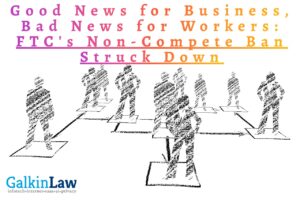
Background
The Federal Trade Commission (FTC) has long advocated for the elimination of non-compete agreements, arguing they stifle competition, depress wages, and limit economic mobility for millions of American workers. The FTC’s rule, issued in April 2024, aimed to ban non-compete agreements across various industries, potentially affecting 30 million workers in the U.S. The ban was scheduled to take effect in September 2024. However, it faced immediate challenges from business groups, who argued that the FTC had overstepped its legal boundaries.
Current Case Decision
On August 20, 2024, U.S. District Judge Ada Brown struck down the FTC’s ban, ruling that the agency lacked the authority to implement such a sweeping regulation. The decision was heavily influenced by the recent erosion of the Chevron Doctrine, a principle that previously allowed courts to defer to administrative agencies’ interpretation of ambiguous statutes. With the Chevron Doctrine no longer holding sway, Judge Brown emphasized that the FTC’s authority to regulate unfair competition did not extend to banning entire categories of conduct, like non-compete agreements. The court found the FTC’s rule to be “unreasonably overbroad” and without a reasonable explanation, thus barring its enforcement.
Implications Going Forward
This ruling is a significant victory for employers who rely on non-compete agreements to protect trade secrets and maintain competitive advantages. For employees, however, this decision represents a setback, potentially limiting their ability to seek better employment opportunities. The ruling highlights the growing judicial resistance to expansive regulatory actions by federal agencies, particularly in the absence of clear congressional authorization. The case could be appealed, and if it reaches the U.S. Supreme Court, it may further clarify or limit federal regulatory authority, especially in labor markets. Meanwhile, the FTC may have to resort to more targeted, case-by-case enforcement actions rather than broad regulatory bans.
#NonCompete #FTC #ChevronDoctrine #LaborLaw #BusinessLaw
